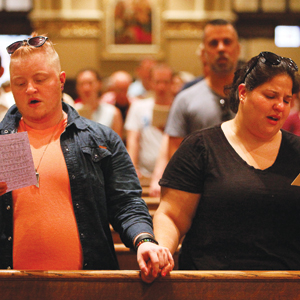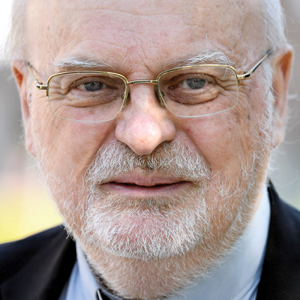Next week, Pope Francis will create five new cardinals. The appointments he has made to the electoral college that will decide his successor reveal his vision for the future.
If there is one area of Church life where Pope Francis is overturning the tables it is in his selection of cardinals, those at the very top of the clerical tree, who will choose his successor.
He has shaken up the system by handing red hats to bishops on the peripheries, authentic voices of their local churches, often humble pastors toiling away in some of the farthest-flung corners of the earth. He’s dramatically pulled away the old ladder of clerical ambition, no longer automatically upgrading to cardinal the leaders of certain prestigious dioceses.
Francis has already given red hats to bishops from 13 countries that have never had a cardinal, and, next Wednesday, he will formally induct another five new members into the College of Cardinals from countries such as Mali, Laos, Sweden and El Salvador, which represent, he points out, the “catholicity of the Church”.
One of the most surprising picks for next week’s consistory is 67-year-old Anders Arborelius of Stockholm. Sweden has just over 100,000 registered Catholics. Even for the largely non-believing, cool-headed Swedes – who last year welcomed the Pope on a visit to Lund that marked the 500th anniversary of the Reformation – having their own cardinal for the first time has generated a flurry of excitement.
“We’ve never had cardinals in Northern Europe before, not even in the Middle Ages, when every country was Catholic, so it is really something – and totally unexpected,” Arborelius tells me when we meet at the monastery and guest house in the Piazza Farnese in Rome run by the Sisters of St Bridget, the Swedish mystic.
The Bridgettine sisters have a special place in Bishop Arborelius’s affections because they played an important role in his decision to became a Catholic at the age of 20. The son of parents who later divorced, Arborelius was brought up in the Lutheran Church of Sweden. Later, he became a Carmelite and then the first bishop of Swedish origin since the Reformation.
But his elevation as a prince of the Church has been the biggest surprise yet. While in the recent past, new cardinals usually received a phone call to tip them off, this Pope – who often stresses the importance of a God who surprises – leaves them to find out after the official announcement has been made.
“I was doing confirmations in a little parish and after the Mass the parish priest, who had been online, came to show me and said: ‘You have been made a cardinal.’ It was a shock because I could not have expected that,” he told me. “When you became a bishop, you are asked – and you are supposed to say ‘Yes’ – but when you become a cardinal it just happens. I think it is a certain kind of policy.”
Rather than coming from a remote corner of the globe, the new Swedish cardinal lives and works in an “existential” periphery, as a member of a small minority maintaining the Church in a post-Christian society. Most Swedes are not religious; surveys show that tax officers are trusted more than priests. As in England, the Swedes underwent a Reformation in the Middle Ages but, as Bishop Arborelius points out, “It was done more efficiently in Sweden.” No “recusants” kept the flame alive in Sweden and, until 1953, Catholics were still banned from certain professions. The Church in Sweden only received equal rights in 2000.
Today, the number of Catholics is slowly growing, thanks to immigration and to the small number of receptions each year. The new cardinal says it is important for the Church to seek a dialogue with the society around it, accept what it cannot change and encourage Catholics to feel confident in their faith. For Arborelius, it is necessary to encourage the Christian culture brought to Sweden by migrants from Poland or the Middle East, while at the same time encouraging newcomers to feel at home as Catholics in Sweden.
“I would say we see with those young people who remain Catholic, they are very eager to be Catholic, they love to be Catholic.” He goes on: “We can try and bring in our values but we have to accept that somehow we live in a dialogue with a surrounding culture that is not totally how we want it to be, yet we still accept it. It is a kind of critical loyalty to the society around us.”
This a model that the Pope clearly approves of, a Church that is authentically living out the gospel, integrated within the society it is serving, but also critically engaged, and on the frontier. It is not the size of the flock that matters but the integrity of the mission.
Take Bishop Louis-Marie Ling Mangkhanekhoun, 73, from Laos, a small communist country in south-east Asia, who does not even lead a diocese. He is the Apostolic Vicar of Paksé, in charge of a population of 14,500 Catholics, with just six priests. Married catechists take a key role in ministry here, while the bishop asks seminarians to take time out mid-way through their formation to obtain pastoral experience by integrating among the local people.
“The positive thing is that we have married catechists who are true missionaries, who go to live in the villages and become the ‘roots’ of evangelisation,” he said in an interview with Asia News. The cardinal-designate also has an intimate understanding of missionary work and of the risks it can involve: in 1970, the communists in Laos killed his cousin, Luc Sy, a lay catechist. He was beatified as a martyr at the end of last year.
Also receiving his red hat next week will be Bishop Gregorio Rosa Chávez, the long-serving auxiliary bishop in the Archdiocese of San Salvador and a close collaborator of the martyred archbishop of the diocese, Oscar Romero. This is another appointment that upends normal protocols and expectations: Cardinal Rosa Chavez will be serving under an archbishop who is not himself a cardinal. But the phrase “to serve, not to be served” could be the motto of this 75-year-old pastor who runs a parish in a run-down part of San Salvador, leads a youth group and is in charge of Caritas, the Church’s charitable arm, in El Salvador, Latin America and the Caribbean. Having reached the retirement age of a bishop and having served 33 years as an auxiliary, his first reaction was to suspect that his nomination as a cardinal must be a joke.
Then there is Mali’s Archbishop Jean Zerbo, 73, a man who tried to follow the Pope’s mantra for the Church to “bind up wounds”. He took an important role in the peace negotiations that took place in 2012, when civil war tore apart his country.
A large chunk of his ministry has focussed on reconciliation in the Muslim-majority country, which still regularly experiences terrorism and violence. His appointment as cardinal, however, has become embroiled in financial controversy. The French newspaper Le Monde has claimed that Catholic bishops in Mali placed €12 million (£10.5 million) in Swiss bank accounts. The cardinal-designate has denied any involvement and maintains that any overseas money was inherited from French colonial missionaries.
The fifth and final nomination is that of the Archbishop of Barcelona, Juan José Omella y Omella, the only new cardinal who will come from a traditionally Catholic European country. While some have seen this appointment as a sign of the Pope’s personal affirmation of the Catalan independence movement, the choice seems more likely to reflect recognition of Omella’s pastoral gifts, and of his contribution to the Spanish Church’s shift away from the culture wars. Back in 2005 he was not part of the anti-gay marriage protest that was organised by the Cardinal Archbishop of Madrid, Ruoco Varela. Only days later, however, he attended a march being held against poverty in Madrid.
By next Wednesday, the Pope will have appointed close to half of the cardinal-electors, the prelates who at an unknown future date – if they are under the age of 80 – will process into the Sistine Chapel during the next conclave and vote for the successor to Francis. Throughout his four-year papacy, the Pope has tried to internationalise this group and encourage the local church to re-establish its role in the universal. His approach has not simply been to re-balance votes, as if to try to create a more representative national parliament. More significantly, Francis is choosing close advisers and cardinal-electors based on their pastoral credentials, restoring an ancient tradition that the role of a cardinal is about service rather than status.
21 June 2017, The Tablet
Expect the unexpected: Francis' five new cardinal appointments reveal his vision for the future
Consistory in Rome
Edmund for England
 Loading ...
Loading ...
Get Instant Access
Subscribe to The Tablet for just £7.99
Subscribe today to take advantage of our introductory offers and enjoy 30 days' access for just £7.99





What do you think?
You can post as a subscriber user...
User Comments (0)